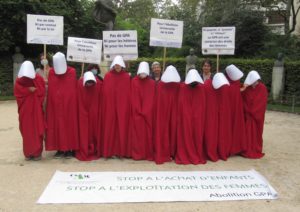PRESS RELEASE ICASM Paris, September 7, 2021

On 4 and 5 September 2021, the DESIR D’ENFANT trade fair was held in Paris: ICASM, supported by its organizations members, was there to oppose this practice, on the theme of the dystopia by Margaret Atwood : the handmaid’s tale. On display and in the workshops it was obvious that behind the glamorous image of surrogacy, lie the interests of the market for which everything can be bought and sold.
This gathering organised by ICASM, supported by Osez le Féministes, Libres Mariannes, the Maisons des Femmes de Paris, the Forum Femmes Méditerranée, CQFD Lesbiennes féministes, the CoRP and the Amazones, was marked by a heartbreaking evocation of all the surrogate mothers who have died from surrogcay, who are invisibilised and ignored. ICASM reaffirmed that parenthood is a choice, not a right, and that no one and nothing can dispose of a child life, and that the trading of women’s reproductive capacity is not worthy of progressive societies.

With the focus on destinations considered advantageous because the remuneration of surrogate mothers is limited by law, with the promotional offers of surrogacy from supernumerary embryos and the guarantees of reimbursement in case of failure, this fair proves once again that surrogacy violates the basic principles on which the equilibrium and viability of our societies rest.
- Optional Protocol to the Convention on the Rights of the Child on the sale of children, child prostitution and child pornography, art. 2a: ” Sale of children means any act or transaction whereby a child is transferred by any person or group of persons to another for remuneration or any other consideration;…”
- The National Ethics Advisory Committee Opinion, Opinion no. 126 (2017): “ An analysis of the relationships between all those playing a role in a surrogacy procedure revealed a number of risks and violations of a medical, emotional and economic nature. (…) CCNE was particularly struck by the acceptance of the low, but not inexistent, risk for the carrier of death or serious health impairment. Neither the intended parents nor the surrogacy promoters appear to be concerned about it.”.

ICASM S is an international organisation that campaigns for the abolition of surrogacy throughout the world. It gathers forty organizations from thirteen countries and three continents, which fight for women’s rights and/or human rights. It is an organization that bases its action on feminist values, such as equality between men and women, self-determination and women’s emancipation. In its statutes, it clearly mentioned its stand for equality of homosexual and heterosexual sexualities.
Press contact: Marie Josèphe Devillers +-
Gathering organized by CIAMS
Action against the DESIR D’ENFANT exhibition, inspired by Margaret Atwood’s Dystopia: The Scarlet Handmaiden


The ‘DESIR D’ENFANT’ fair (wish for a bay fair) promotes surrogacy, which is strictly prohibited in France.
Below is an account of a visit to the fair by Carlotta Capelletti.
“I walk into the fair and feel uncomfortable. The stands are crammed together and there are photos of happy, smiling families, pregnant women and perfect babies everywhere.
Several conferences are on the agenda. In the first, a happy gay father describes his experience as ‘an extraordinary human journey’. He tells us that he is the father of two children born through surrogacy. The surrogate mother, who carried his two children, is standing next to him (1). They describe this experience as magical. From the outset, the two men have regarded their surrogate mother as ‘a full member of the family’. During his speech, family photos are shown on a screen. “If I had to do it all over again, I would do everything exactly the same way,” he continues.
To be honest, it feels like I’m watching a theatrical performance, and the actors aren’t very good. A French lawyer then speaks, reminding us that this practice is illegal in France but not at all illegal abroad. She reassures us prospective parents.
Then it is the specialists’ turn. The doctor from the San Diego Fertility Clinic explains that one or two embryos can be implanted in the surrogate mother’s uterus, but it is safer to implant only one. Interestingly, when asked how many embryos can be implanted, she replies, ‘As many as you want.’ She has just told us that implanting two embryos carries more risks for the surrogate mother, yet she says that if we want to, we can use three, four or even more. As in any commercial practice, the most important thing is customer satisfaction. The most frequently used phrases are: ‘We are here to support you throughout the process’ and ‘We help you fulfil your desire to have a child’. The clinics exist to fulfil the wishes of the intended parents, who are the real protagonists. After all, they are the ones who pay. No one ever talks about the surrogate mother. It’s similar to when you’re looking to buy a flat: if you don’t like the first one, they’ll show you a second, then a third, until demand meets supply.
I look at the audience around me. At surrogacy conferences, the audience is mainly gay couples and single women. There aren’t many people, which reassures me in a way. I would say the average age is around 35 or 36. Generally, the audience is aged between 30 and 45. My friend and I, who accompanied me on this adventure, are among the youngest.
When I ask questions at the clinic’s stand, I am told that the total cost of the procedure is $150,000 without any problem, and that $45,000 is for the surrogate mother. It’s as if they’re saying, ‘She’s well paid, don’t worry about her’. But my thoughts go in the opposite direction: who does the remaining $105,000 go to? One can only imagine the clinics’ profits.
“But if you want to reduce costs,” says this French lady living in the United States, “you can use a Canadian surrogate mother. You know, they’re not supposed to be paid over there; they only receive ‘expense reimbursements’, but in reality they are paid.’ But less than in the United States, all the same. For all those who continue to argue that altruistic surrogacy is possible, here is an answer from someone who knows this business well.
As for genetic material, which must be identified and prepared, the pandemic has not stopped the market. On the contrary, it has allowed clinics to find an alternative which will most likely continue to be used even after the pandemic has passed.
This alternative is sperm freezing. Before the pandemic, if a man in a heterosexual couple or both partners in a homosexual couple wanted to donate sperm for IVF, they had to travel to the United States. Now, thanks to European partners, sperm can be frozen in Europe and sent to the United States. The clinics receive the sperm directly at their premises, meaning one less plane ticket for the donor to pay for. How convenient!
Interestingly, a single woman without a sperm donor can choose to use a ready-made embryo. I am told that, when IVF is performed, several embryos are created, but not all of them are implanted in the surrogate mother’s uterus. Therefore, it is possible to determine the fate of these embryos: they can be destroyed, used for research or stored and reused in another IVF procedure.
The gentleman explained to me that, as a single woman, the cost is lower if I choose a ready-made embryo. Using two donors to create embryos would cost around £35,000, but choosing a ready-made embryo would cost a third of that. The disadvantage, he tells me, is that I have less choice. I look at him, perplexed, unsure if I have understood correctly. He explains that there are not many frozen embryos available. However, if I select the donors directly, I have a much wider choice. Once again, I can’t help thinking that this is a commercial practice that enables me to create a bespoke baby. Of course, if I want to ensure that the baby has brown eyes like mine, I have to spend a little more money. However, if I accept this offer of frozen embryos and take the risk of having a baby with blue eyes, I save a little money. It’s like I’m at IKEA, where ready-made furniture is cheaper, but if I want something custom-made that I can put together however I want, I have to pay more. The difference here, at the ‘Desire for Children’ fair, is that we are talking about children — human beings whose best interests are certainly not to be sold or bought.
While the gentleman is explaining the embryo business to me, I accidentally drop a business card from another clinic. He says to me, ‘Ah! You’ve been to see my competitors!’ It’s all about a market with sellers and potential customers, and competition. Prices are justified on the basis of quality and ‘guarantees’. How can we talk about free choice? How can we refuse to acknowledge that this is the exploitation of women’s bodies and reproductive capacities for financial gain?
When I ask if the surrogate mother can change her mind and decide to keep the child, I am told that this never happens and that it is more common for the intended parents to change their minds and not come to collect their baby. I find this hard to believe. Once again, it’s as if the child is a consumer good that can be returned if the buyer changes their mind. What then happens to this child? This baby, who has asked for nothing, is left abandoned and without a family.
I consider France complicit in the exploitation of women and the sale of children because it allows this kind of market to flourish within its borders. Why is surrogacy banned in France? Because it is an affront to human dignity. Very well. I agree. But why, then, do our leaders allow French couples to resort to this practice abroad? And why do they allow a trade fair promoting surrogacy to be held?
This experience leaves me with one question and one certainty. The question is whether humanity will succeed in setting limits for itself or continue to push the boundaries until science and technology allow it to do so.
The certainty is that just because we can do something does not mean that we should. ‘Just because you can, doesn’t mean you should.’ There are rights — in this case, the rights of women and children — that cannot be sacrificed in the name of desire. Because a desire, even if legitimate, is still not a right.”
(1) This woman’s name is Crystal Rosburg. She was a surrogate mother for a French couple who have already appeared in a documentary called Ghosts of the République: http://www.facebook.com/ghostsoftherepublique/. She is also the senior coordinator of the Nevada Fertility Centre’s international programme. On her Facebook page, she posted photos of conferences she attended during the fair. http://www.facebook.com/profile.php?id=541656029
